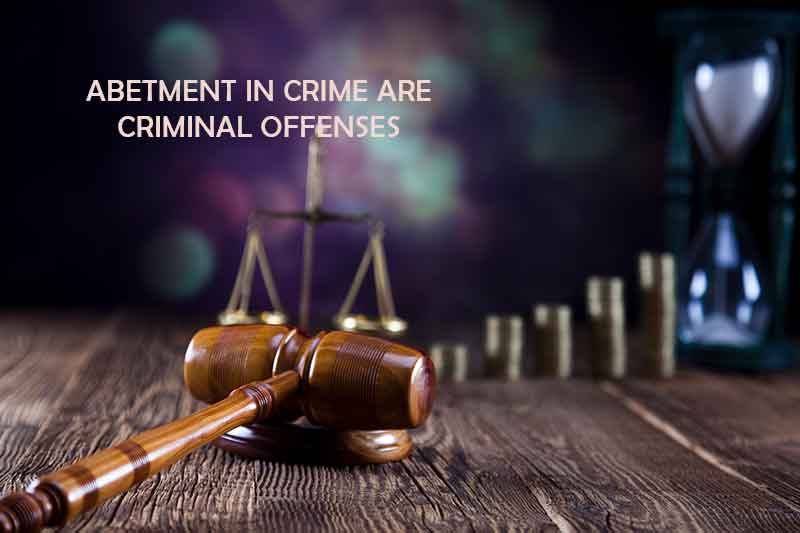The United Arab Emirates maintains a steadfast position on holding individuals accountable for criminal acts, encompassing not only the direct perpetrators but also those who aid or abet in the commission of unlawful activities. The concept of aiding and abetting entails the intentional facilitation, encouragement, or assistance in the planning or execution of a criminal offense. This legal principle ascribes culpability to individuals for their conscious involvement, even if they did not directly perpetrate the crime themselves. Within the UAE’s legal framework, aiding and abetting can result in severe penalties, often commensurate with the punishments prescribed for the principal offense.
Garnering a comprehensive understanding of the ramifications associated with this principle is of paramount importance for residents and visitors alike, as inadvertent actions or omissions can potentially implicate them in criminal proceedings, necessitating a thorough grasp of the relevant legal provisions.
What Constitutes Aiding and Abetting a Crime under UAE Law?
The United Arab Emirates’ current Penal Code, Federal Decree-Law No. 31 of 2021 [On the Issuance of the Crimes and Penalties Law], provides the legal definition of what constitutes aiding and abetting a crime. According to Articles 45 and 46 of this law, a person is considered an accomplice if they intentionally and knowingly assist or facilitate the commission of a criminal act.
Intention and knowledge of the crime are crucial factors in determining accomplice liability under UAE law. Mere presence at the scene of a crime, without active participation or intent to aid the perpetrator, does not automatically constitute aiding and abetting. The extent of an accomplice’s involvement dictates the severity of the penalty they face. Article 46 states that an accomplice may receive the same penalty as the perpetrator or a lesser punishment, depending on the specific circumstances and their level of participation in the criminal act.
Some examples of actions that could constitute aiding and abetting under UAE law include providing weapons, tools or other means to commit the crime, encouraging or instigating the perpetrator, assisting in the planning or execution stages, or helping the perpetrator evade justice after the fact.
It is important to note that the legal interpretations and applications are ultimately at the discretion of UAE judicial authorities on a case-by-case basis.
Абетменттин элементтери
Актынын квалификациялуу болушу үчүн эки негизги элемент аткарылышы керек:
- Actus Reus (Күнөөлүү акт): Бул чагымчылдык, кутумга катышуу же атайылап жардам көрсөтүү боюнча конкреттүү аракеттерди билдирет. Actus reus - бул кылмыштын физикалык компоненти, мисалы, кимдир-бирөөнү талап-тоноочулукка үндөгөн же аны жасоо үчүн каражат менен камсыз кылуу.
- Mens Rea (The Guilty Mind): Азгырыкчыда кылмышты козгоо, жардам берүү же кылмыш жасоого көмөк көрсөтүү ниети болушу керек. Mens rea кылмыштын психикалык элементин билдирет, мисалы, кимдир-бирөөнүн кылмыш ишин жасоого жардам берүү ниети.
Кошумчалай кетсек, жалпысынан алганда, көмүскө кылмыш иш жүзүндө ийгиликтүү ишке ашырылышы үчүн эч кандай талап жок. Азгырыкчы кылмыштын өзү эч качан аягына чыкпаса дагы, алардын ниети жана кылмышты жайылтуу боюнча жасаган аракеттеринин негизинде гана жоопко тартылышы мүмкүн.
Көрсөтүүнүн түрлөрү же формалары
үч негизги жолу бар кылмыш аборт пайда болушу мүмкүн:
1. шыктандыруу
Түз же кыйыр түрдө аныкталат чакырды, провокациялоо, бекемдээрликже сурап алуу башка бирөө кылмыш жасоого. Бул сөздөр, ишараттар же башка байланыш каражаттары аркылуу болушу мүмкүн. Ыкчам козгоо активдүү катышууну жана кылмыштуу ниетти талап кылат. Мисалы, кимдир-бирөө досуна банкты тоноону кайра-кайра айтса жана аны кантип жасоо керектиги боюнча деталдуу пландарды берсе, досу эч качан каракчылык менен алектенбесе да, алар кылмышка шыкакчы болушу мүмкүн.
2. кутум
An макулдук эки же андан көп адамдардын ортосунда кылмыш жасоо. Көбүнчө каралат аборттун эң оор түрү, кутум, андан аркы кадамдарга же жасалган аракеттерге карабастан, келишимди гана талап кылат. Адамдар эч качан пландалган кылмышты ишке ашырбаса да, кутум болушу мүмкүн.
3. Атайылап жардам берүү
Жардам же курал-жарак, транспорт сыяктуу ресурстар менен камсыз кылуу, атайылап кылмыш иш-аракетине жардам берген кеңештер. Атайылап жардам берүү активдүү катышууну жана ниетти талап кылат. Жоопкерчилик азгырыкчы кылмыш болгон жерде физикалык жактан жок болсо да колдонулат. Мисалы, кимдир-бирөө досуна машинасын пландалган тоноодо колдонуу үчүн карызга берсе, алар кылмышка атайылап жардам берген деп күнөөлүү болушу мүмкүн.
Difference between Abettor and Offender
| Abettor (Accomplice) | Offender (Perpetrator) |
|---|---|
| An abettor or accomplice is an individual who intentionally aids, facilitates, encourages, or assists in the planning or execution of a criminal act. | An offender, also known as a perpetrator, is the individual who directly commits the criminal act. |
| Abettors do not directly commit the crime themselves but knowingly contribute to its commission. | Offenders are the principal actors who carry out the unlawful act. |
| Abettors can be held liable for their role in supporting or enabling the crime, even though they did not personally carry it out. | Offenders are primarily responsible for the criminal offense and face the full extent of the prescribed punishment. |
| The level of involvement and intent determines the extent of an abettor’s culpability and punishment, which may be equal to or lesser than the offender’s. | Offenders typically receive the maximum penalty for the committed crime, as they are the direct perpetrators. |
| Examples of abetting actions include providing weapons, tools, or assistance, encouraging or instigating the crime, aiding in planning or execution, or helping the offender evade justice. | Examples of offender actions include physically committing the criminal act, such as theft, assault, or murder. |
| Abettors can be charged as accomplices or co-conspirators, depending on the specific circumstances and their level of involvement. | Offenders are charged as the principal perpetrators of the crime. |
This table highlights the key differences between an abettor (accomplice) and an offender (perpetrator) in the context of criminal acts, based on their level of involvement, intent, and culpability under the law.
Punishment for Abetting a crime in UAE
According to the UAE Penal Code (Federal Decree-Law No. 31 of 2021), the punishment for abetting a crime depends on the nature of the abettor’s involvement and the specific crime they aided or abetted. Here’s a table outlining the potential punishments based on different types of abetment:
| Primary Type | баяндоо | жаза |
|---|---|---|
| Instigation | Deliberately encouraging or urging another individual to engage in criminal conduct. | Equivalent to the penalty imposed on the principal offender if the instigator was aware of the intended crime (Article 44 of the UAE Penal Code). |
| жашыруун сөздөнүү | A premeditated agreement among two or more parties to carry out an unlawful act. | Conspirators are generally subjected to the same punishment as the main perpetrator. Nonetheless, the judge retains discretionary power to reduce the sentence (Article 47 of the UAE Penal Code). |
| Intentional Aiding | Knowingly providing assistance or support to another person with the understanding that they plan to commit a crime. | The severity of the penalty varies, contingent upon the gravity of the offense and the degree of assistance rendered. Punishments can range from monetary fines to incarceration (Article 48 of the UAE Penal Code). |
What are the defenses Against Abetment Charges in UAE
Жабырлануу оор кылмыш деп эсептелгени менен, тажрыйбалуу кылмыш коргоочу адвокат колдоно турган бир нече мыйзамдуу коргоочулар бар:
- Талап кылынган ниеттин же билимдин жоктугу: Эгерде азгырыкчы кылмышка жардам берүү же шыктандыруу ниети болбосо, же аракеттердин кылмыштуулугун билбесе, бул коргонууну камсыздай алат.
- Кылмыштуу кутумдан баш тартуу: Эгерде азгырыкчы кылмыш жасалганга чейин кутумдан баш тартса жана анын болушуна жол бербөө үчүн чара көрсө, бул жоопкерчиликти жокко чыгарышы мүмкүн.
- Мажбурлоону же мажбурлоону талап кылуу: Эгерде азгырыкчы зыян же зордук-зомбулук коркунучу астында кылмышка жардам берүүгө же шыктандырууга аргасыз болсо, бул коргонуу катары кызмат кылышы мүмкүн.
- Кыймыл менен кылмыштын ортосундагы ишке ашпай калган жакынкы себепти көрсөтүү: Эгерде опузалоочунун аракеттери кылмыштын жасалышына түздөн-түз салым кошпосо, бул жоопкерчиликти белгилөө боюнча прокуратуранын ишин алсыратышы мүмкүн.
- Mistake of fact: If the abettor had a reasonable belief that the act they aided or abetted was not illegal, based on a mistake of fact, this could provide a defense.
- Entrapment: If the abettor was induced or entrapped by law enforcement to aid or abet the crime, this could potentially serve as a defense.
- Statute of limitations: If the prosecution of the abetment charge is brought after the legally prescribed time limit or statute of limitations, this could result in dismissal of the case.
Потенциалдуу стратегияларды түшүнүү жана соттук практиканын прецеденттерин колдонуу ээнбаштык айыптоосуна каршы эффективдүү коргонууну куруунун ачкычы болуп саналат.
жыйынтыктоо
БАЭде жаткыруу кылмышы жеңил кабыл алынбашы керек. Кылмыштын өзү эч качан ийгиликтүү ишке ашпаса да, шыктандыруу, шыкактоо же кандайдыр бир кылмыш иш-аракетине көмөктөшүү катуу жазаларды алып келет. Баардык БАЭ жарандары үчүн бул татаал мыйзамдарга аралашпоо үчүн конкреттүү элементтерди, жатыштын түрлөрүн, жазалоо мыйзамдарын жана потенциалдуу укуктук коргоону күчтүү түшүнүү зарыл. Тажрыйбалуу кылмыш коргоочу адвокатка эртерээк кайрылуу түрмөдө көп жыл өтүүнүн же куугунтуктоодон таптакыр качуунун ортосундагы айырманы билдирет.
Эгер БАЭде сизди тергеп, камакка алышса же жаткырууга байланыштуу кылмыш иши козголсо, дароо юридикалык кеңешке кайрылуу абдан маанилүү. Билимдүү адвокат сизге юридикалык процесс аркылуу жетекчилик бере алат, укуктарыңызды коргойт жана ишиңиздин эң жакшы натыйжасын камсыздай алат. Кошумча мыйзамдардын татаалдыктарын өз алдынча чечүүгө аракет кылбаңыз – мүмкүн болушунча тезирээк юридикалык өкүлчүлүктү сактап калыңыз.
Сиздин мыйзамдуу биз менен консультация кырдаалды жана тынчсызданууларды түшүнүүгө жардам берет. Жолугушууну пландаштыруу үчүн биз менен байланышыңыз. Шашылыш жолугушуу жана жолугушуу үчүн бизге азыр чалыңыз +971506531334 +971558018669

